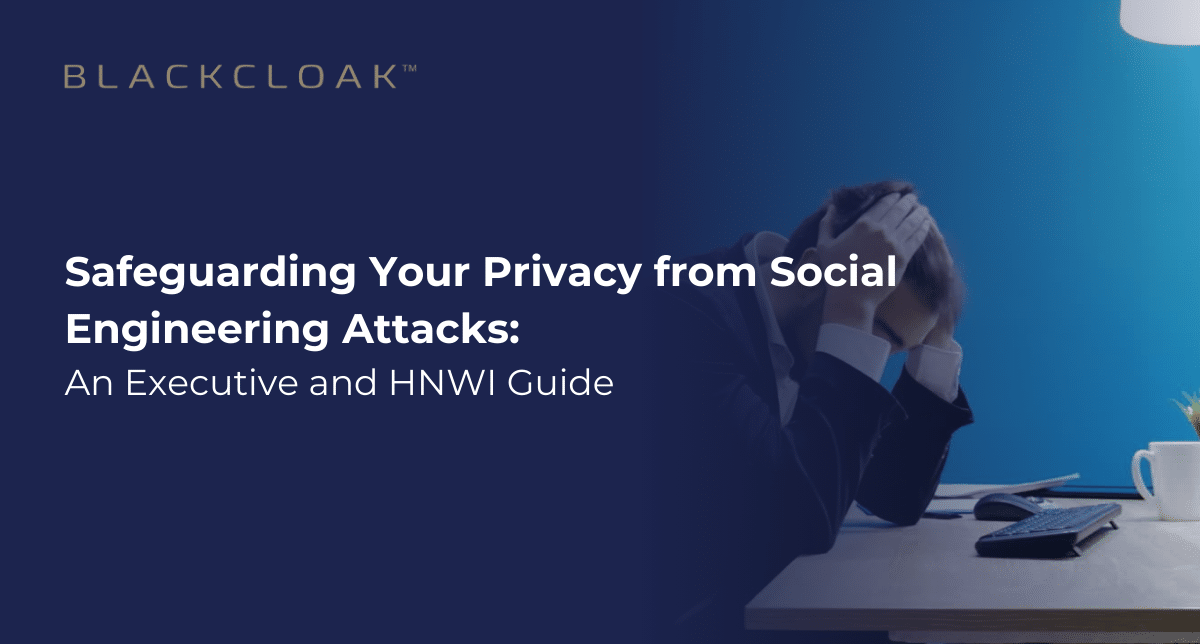How to Stop Social Engineering Attacks: An Executive and HNWI Guide

A term that is becoming increasingly familiar to executives and High Net Worth Individuals (HNWI) is “social engineering.” These attacks are not merely a problem for IT departments but can threaten the very core of a person’s personal and professional lives. Here at BlackCloak.io, we are committed to helping you understand what social engineering attacks are and how you can actively safeguard your privacy online.
What Are Social Engineering Attacks?
Social engineering attacks are manipulative tactics that exploit human psychology rather than technical hacking techniques. They involve tricking individuals into divulging confidential information, such as passwords, bank details, or sensitive company data.
The Most Common Forms of Social Engineering Attacks:
Phishing: Emails or text messages that appear to be from reputable sources, but are designed to steal personal information. Spear-fishing, a type of phishing where bad actors target specific high-access or high-income targets, is one of the biggest cyber threats to executives and board members.
Pretexting: Creating a fabricated scenario to obtain personal information. These may involve a false internet survey requesting personal details, or even someone who comes to your work or residence, requesting personal information for nefarious means.
Baiting: Offering something enticing to trick an individual into revealing private information. This can be as simple as a USB drive left in a commonly-used workspace, that, when inserted into your computer, installs malware.
Vishing and Smishing: Also known as “voice fishing,” bad actors use phone calls and SMS messages to try and obtain login credentials, social security numbers, and bank account information.
Quid pro quo: These social engineering attacks offer victims a product or service in return for sensitive data or access. “Scareware” is a common example, where bad actors promise computer users improved cybersecurity to address an urgent security issue. However, the scareware itself is the real security issue.
Contact spamming and email hacking: This social engineering attack involves hacking into an individual’s email or social media accounts to gain access to more victims. Hackers use the trust users have in their friends and business contacts to gain access to private information—or even to ask for money outright.
How to Stop Social Engineering Attacks
Pause and Verify: Social engineers use urgency to bypass rational thinking. Always verify requests via a different communication method, especially if they demand immediate action or sensitive information. Question the origin of unexpected emails, calls, or physical items. Authentic messages from institutions will be professional and accurate. Verify suspicious links or errors by directly contacting the source through official channels.
Insist on ID Verification: In any situation requiring access or information, especially in person, asking for identification can prevent unauthorized entry or information disclosure.
Utilize Advanced Email Filters: Implement strong spam filters to catch phishing attempts and dubious emails, adjusting settings for maximum protection.
Limit Online Exposure: Adjust social media settings to private and be cautious about the personal information shared online to reduce the risk of being targeted based on your digital footprint.
Implement Multi-Factor Authentication: By requiring multiple forms of verification, you add an extra layer of security to your accounts.
Secure Your Online Presence: Keep devices protected with the latest antivirus solutions, unique passwords for different accounts, and data broker removal services. Executives and high-net-worth individuals who are at increased risk of social engineering attacks should consider personal cybersecurity services.
Remaining Protected in the Executive and HNWI Threat Landscape
As executives and HNWIs, you are particularly lucrative targets. Your personal information, financial assets, and professional connections make you attractive to cybercriminals. The best strategy is to stay informed. This involves:
Educating Yourself and Your Team: Regular training sessions can keep everyone aware of the latest social engineering tactics.
Collaborating with Experts: Engage with a personal cybersecurity firm, such as BlackCloak.io, to develop a customized, comprehensive protection plan.
Take Control of Your Privacy
Social engineering attacks are deceptive, cunning, and, unfortunately, highly effective if the proper protective measures are not in place. Your role as an executive or HNWI puts you in the crosshairs, but it also empowers you to take control.
With awareness, education, multifaceted protection strategies, and collaboration with experienced partners such as BlackCloak.io, you can build an impenetrable shield around your personal and professional life.
Don’t allow social engineering to catch you off guard. Equip yourself with the knowledge and tools to maintain your privacy and security online. Request a demo, or reach out to us at BlackCloak.io. Let’s start building your defense today.





